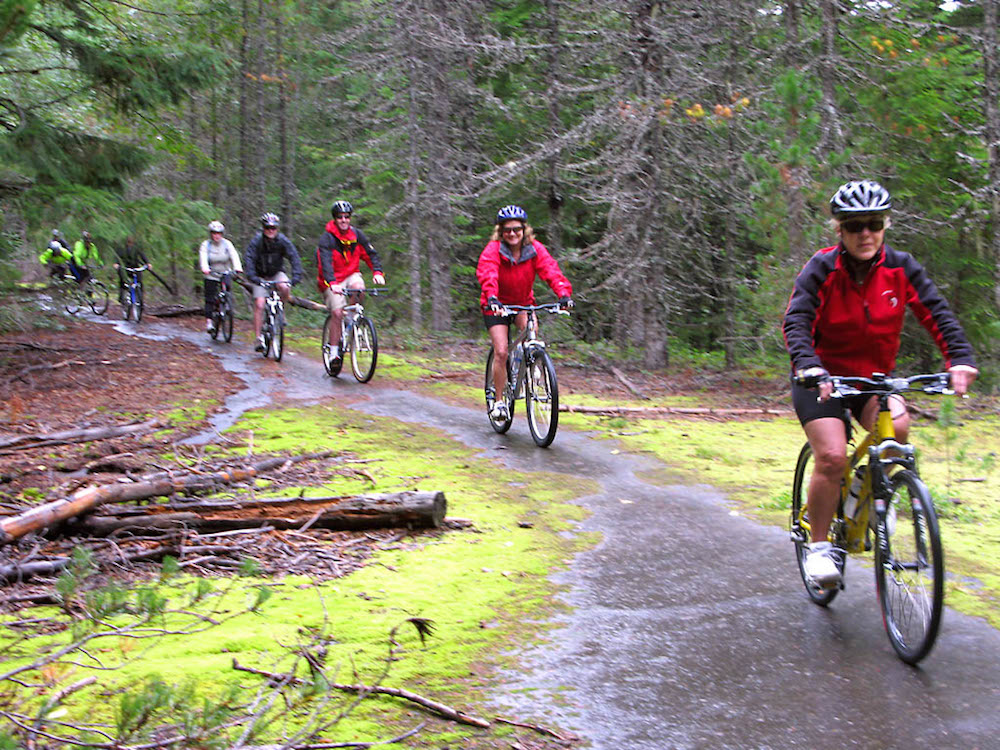Portland, Oregon. You may know it as Portlandia, but for Portlanders, one of the benefits of living in the #1 city in the United States for 2013 according to Movoto.com is the accessibility of Mt. Hood, or what we just call “the Mountain.”
Mt. Hood forms part of our skyline, it is something that helps define this city and its inhabitants. Many of us grew up skiing or boarding on its slopes, taking school field trips to go sledding at ski bunny, or joining the Powder Hounds.
Just 60 miles away from a city of over 600,000 people sits the only place in the United States with lift-accessible skiing year-round.
Because of the WPA-built Timberline Lodge, we outdoor-loving Oregonians have been drawn to the mountain for darn near a century. Its closeness to our Rose City has meant that a large part of the population here participates in Winter sports of some kind.
Portland benefits from the proximity to the Cascade Mountain Range, with Mt. Bachelor’s excellent powder only 162 miles away, and the city of Bend, Oregon a winter resort perfect to host a secondary athlete’s village.
With access to Interstate 5 and Interstate 84, Portland International Airport (PDX) – Condé Nast’s #1 U.S Airport (2006, 2007, 2008, and 2010) – with direct flights to the US hubs, Europe, and Asia, and an award-winning mass transit system, Portland has the transportation infrastructure to host the World for the 2026 Winter Games.
On the banks of the Willamette River in Portland sits the 20,000 seat Moda Center – home to the Portland Trailblazers, Portland Winterhawks Hockey team and the host site of the 2005 State Farm US Figure Skating Championships. Next door on the Rose Quarter campus is the publicly-owned 13,000 seat Veterans Memorial Coliseum, with WHL ice and seating configurations. A couple of streetcar or MAX stops away is the Leed-certified Oregon Convention Center.
What makes Portland unique (other than our world-renowned foodie culture and Beervana) is that we could host the greenest Winter Olympics in history. Athletes, coaches, spectators, and media could easily walk, bike, or take mass transit throughout the Olympic Village and to indoor venues.
Our land use planning laws and the Mt. Hood National Forest would ensure development of Olympic venues and any necessary upgrading to Olympic-caliber facilities (and we already have World-class slopes) would by-design protect the environment we cherish.
There’s a phrase being bandied about the internet by the US Paralympic team – “it’s not what’s missing, it’s what’s there” and this is exactly what the “not in my backyard” mentality is missing – the opportunity to have an Olympic Games that is the model for the future.
The three big concerns about staging a games are corruption, cost, and environmental concerns, and if there ever was a city and a region that could creatively solve these issues it’s Portland.
We are a region of outdoor enthusiasts, and the mountain forms part of this city’s consciousness as much as environmental awareness does. A key part of the Olympic movement, if you read the IOC’s website, is that of a games leaving a legacy for the hosting community. If you don’t believe in the Olympic movement and the Olympic ideal, there’s little starting point for a conversation on this topic, but if you do, even a little, then there is not only a profound positive legacy hosting a games could have on Oregon, Portland, and the Pacific Northwest, but also a positive legacy we could bring to the World.
With such a strong history in Oregon of community involvement, public discourse, and strong debate over any form of public-private partnerships, development, or infrastructure projects, there is little doubt that the “watchdogs” of Oregon would ensure that those involved in staging a games were scrutinized, and brought to task if they did not shepherd the Olympic dollar and the environment well.
Where a games benefits a community is in lasting infrastructure investment. Monies are invested into a community to build or refurbish athletic facilities, build or update transportation infrastructure, stimulate tourism and small business, and, and I cannot stress this enough, pump funds into the arts.
In Vancouver, BC, the Skytrain system, Sea-To-Sky highway, BC Place, Amtrak Cascades, border crossings on the US and Canadian side, and much much more benefited by the 2010 winter games (I lived in Vancouver for a decade and have seen first-hand the positive changes the games brought to that city). Arts organizations in BC received Federal dollars (because of the Olympics) to ensure there was a cultural “games” going on in concert with the athletics. This investment provided benefits long after the athletes left the province.
Here at home Portland has a number of initiatives in the planning stages that could see a benefit from additional external Olympic funding as a result of a games – the CRC, the replacement or modernization of Memorial Coliseum, future expansion of Max, these are great examples.
With the recent landslides on I-84, an Olympic bid could help legislators bring Federal monies towards improvement of I-84, and Hwy 26. We could develop transportation to the mountain from Parkdale, generating new tourism monies for communities in the Gorge.
As for environmental concerns, this is where we Oregonians truly have a unique place in the World. The Gorge can’t be developed in the scenic corridor, Timberline is part of the Mt. Hood National Forest, the Oregon Convention Center is already a LEED certified building. MAX exists. In short, instead of looking at what might go wrong, we have a great starting point for what could be done right, and better, and in such a way that we show the World how you could and should do a games that is environmentally responsible.
It is precisely people who have concerns that a team staging a games needs – individuals with a proactive and creative mindset who want to ensure a Winter Olympics are run with a keen eye towards fiscal responsibility and environmental awareness and are focused on leaving a positive legacy to the community long after the games are over.
We have some initial specific ideas at portland2026.com and are seeking more. A community is growing that believes in the dream of a games held in Oregon. As this community grows we can focus on what’s there, and what can be, positively, proactively, and uniquely, Oregon.
You are invited to share the love.
Matthew Subotnick is the coordinator of Portland 2026.
Shred Hood welcomes guest editorials relevant to the Mount Hood community. To submit an essay, email the editors.
Last modified: February 28, 2014


